At the start of the year 10 riders were picked to follow during the season. These were not necessarily the best riders – why didn’t you pick Sagan was a refrain in the comments – but more those with a point to prove, a story to tell or some other interest. How did they get on?
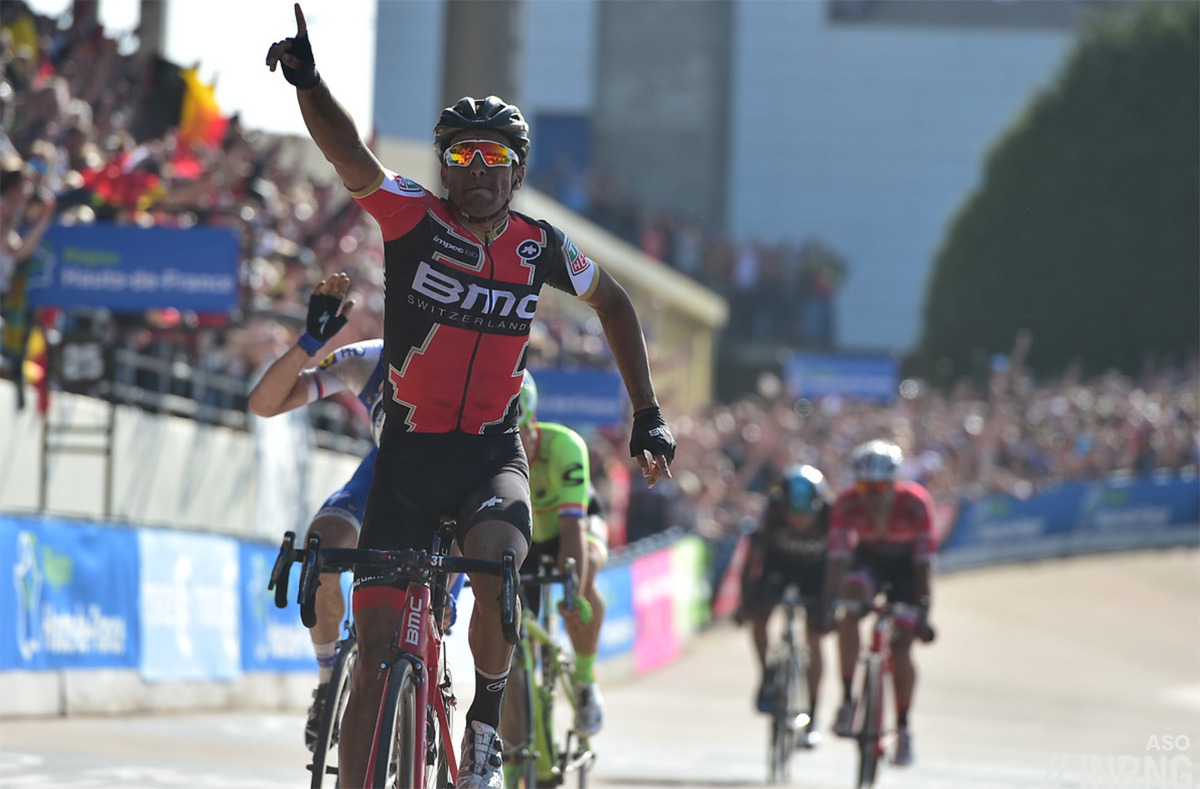
For Greg Van Avermaet it was a question of what more could he do? 2016 had seen spring classics, a spell in yellow and then Olympic gold so how to follow that up? As joked here before it was all great but someone – probably Roger De Vlaeminck – would be propping up a bar saying “But Jonge, you haven’t won De Ronde“. GVA still hasn’t but instead he took the Omloop Het Nieuwsblad, was second on the Strade Bianche and won the E3, Gent-Wevelgem and Paris-Roubaix… and was second to his great rival Peter Sagan in De Ronde. Much of the spring was consumed by Tom Boonen’s farewell tour so it’ll be interesting to see how GVA fares in 2018 with the weight of expectation on his shoulders but as we saw this year he can deliver. The rest of 2017 was solid but not spectacular, second on the GP de Québec, sixth in the Worlds.
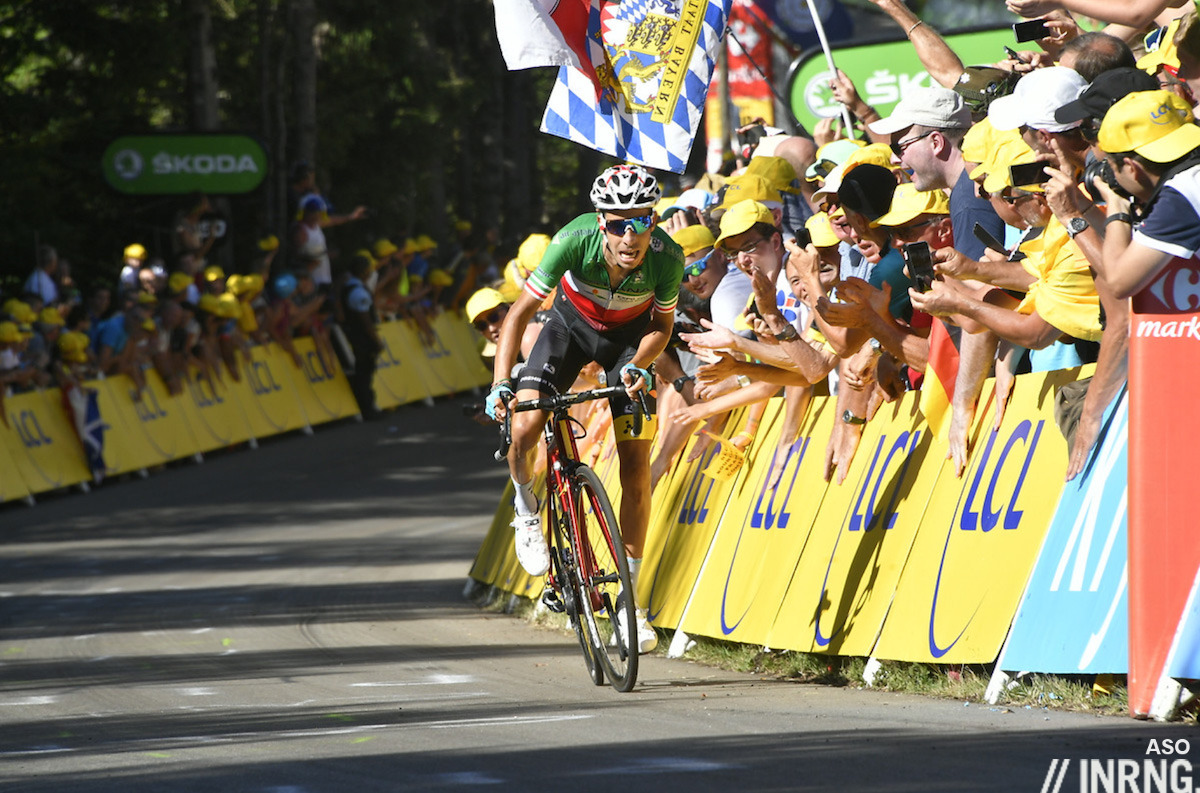
Fabio Aru has a Vuelta win and has twice stood on the podium of the Giro but 2016 was a season to forget, his stage win in the Dauphiné achieved on a descent symbolic of how he could not drop his rivals on the climb so could he get back to grand tour glory in 2017? Yes and no, the year was better but rushed. In April a crash in training hurt his knee and he was forced to sit out the Giro which must have hurt even more as it started on his home island of Sardinia. He switched focus to the Tour de France and in the build-up took the Italian national championships with a bold solo win. In the Tour he won at La Planche des Belles Filles and wore the maillot jaune yet paradoxically neither he nor his Astana team managed to weigh on the race as much as these results might imply. If anything his brief spell in yellow meant Team Sky could deploy alternative tactics for a day and it contributed to one of the best days of the race on the stage to Foix. He finished fifth overall and then went onto ride a discreet Vuelta as contract talks happened and he and his entourage arranged a move to UAE Emirates which left Astana boss Alexandr Vinokourov claiming he’d sue. Now Aru will return to the Giro and 2018 will be crucial to see if he’s a gadfly, an animator who can win stages and wear the maglia rosa for a day or two or whether he can win the general classification in a grand tour again. So far the forecast Giro route says he’ll be hunting stages and popularity in the Giro and aiming for the Vuelta.

“Thibaut Pinot had a great season in 2016 until the wheels came off mid-summer” said January’s piece. Bis repetita as he had a great 2017 until mid-summer only this time he came back for late season flourish. At the start of the year he beat Alberto Contador in a duel on a summit finish of the Vuelta a Andalucia, Contador proving too excitable as Pinot paced himself better. Pinot then ran a close second to Peter Sagan in an uphill sprint in Tirreno-Adriatico and had a top-10 in Strade Bianche. After finishing second overall with a stage win in the Tour of the Alps he went into the Giro as a real contender, took a stage in Asiago and finished fourth overall, a great debut for the Frenchman who loves racing in Italy and enjoys popularity and recognition from the tifosi. He had to race the Tour de France but his recovery was off and he seemed to be there out of duty rather than desire and eventually quit the race only to recover in time to win the Tour de l’Ain where he shepherded his 20 year old team mate David Gaudu to a stage win and then continued his season with Lombardia in mind where his flurry of attacks on the final climb of San Fermo della Battaglia lit up the race although Vincenzo Nibali profited. A solid season but there’s talk FDJ – the state lottery, not the team – could be privatised by the French government and the team needs even more Tour success than Arnaud Démare’s sprint wins.
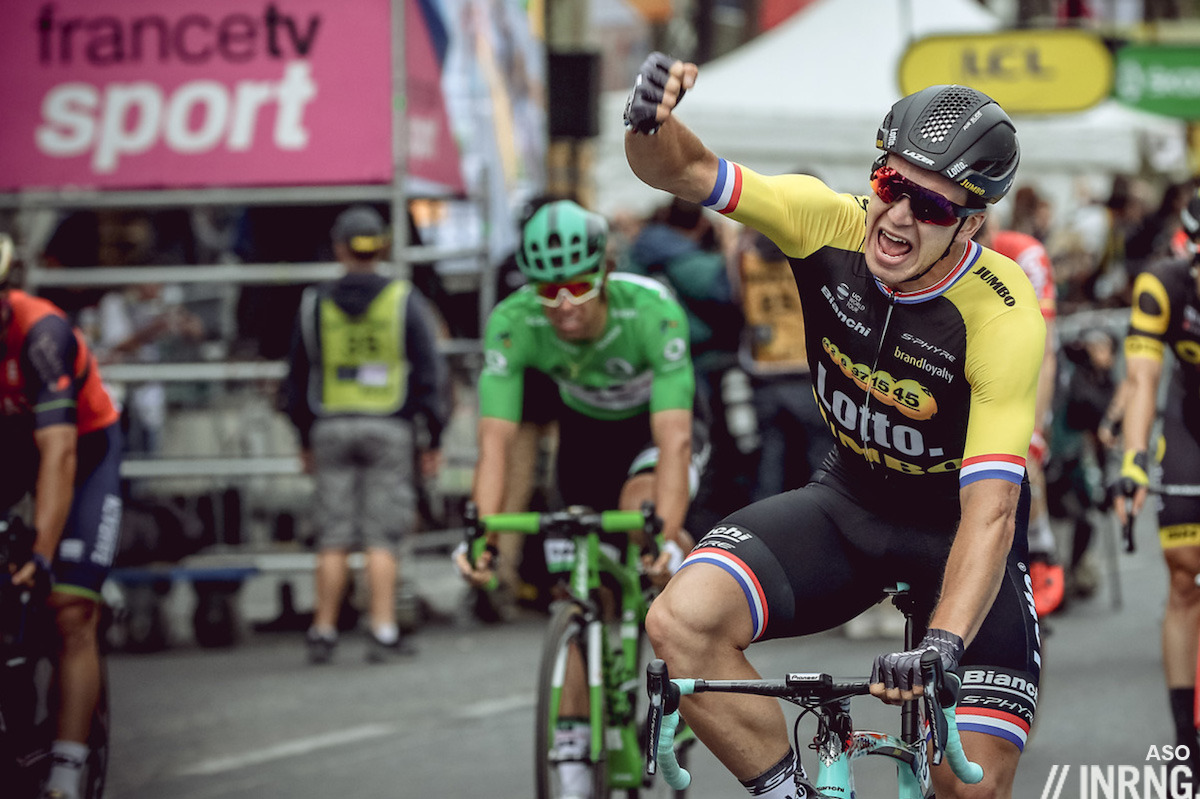
Dylan Groenewegen was the pick of the sprinters as the up-and-coming sprinter but a curiosity because his media profile is relatively low in a field where the challengers to Kittel, Greipel and Cavendish normally bathe in limelight. 2017 was mixed, he had a lot of podium places, plenty of top fives but only eight wins and a very busy season: when measured by kilometres raced only four riders managed more than him. Over-raced? Possibly but maybe he thrives on the distance? He’s been central to Lotto-Jumbo and delivered a prestige win on the Champs Elysées, his biggest sprint by far. 2018 will see if he can deliver more World Tour wins.
Tiesj Benoot is still a hard rider to categorise. Labelled in January as the “best climber among classics contenders” this label stuck again, in fact it’s been ironed on. He had several top-10s in the spring classics and then had a good Dauphiné and finished 20th overall in the Tour de France. He was often instrumental in the success of Tim Wellens who could attack knowing Benoot was there to mark rivals or ready for the counter move. But no wins and only two trips to the podium for a rider with such an obviously big engine.
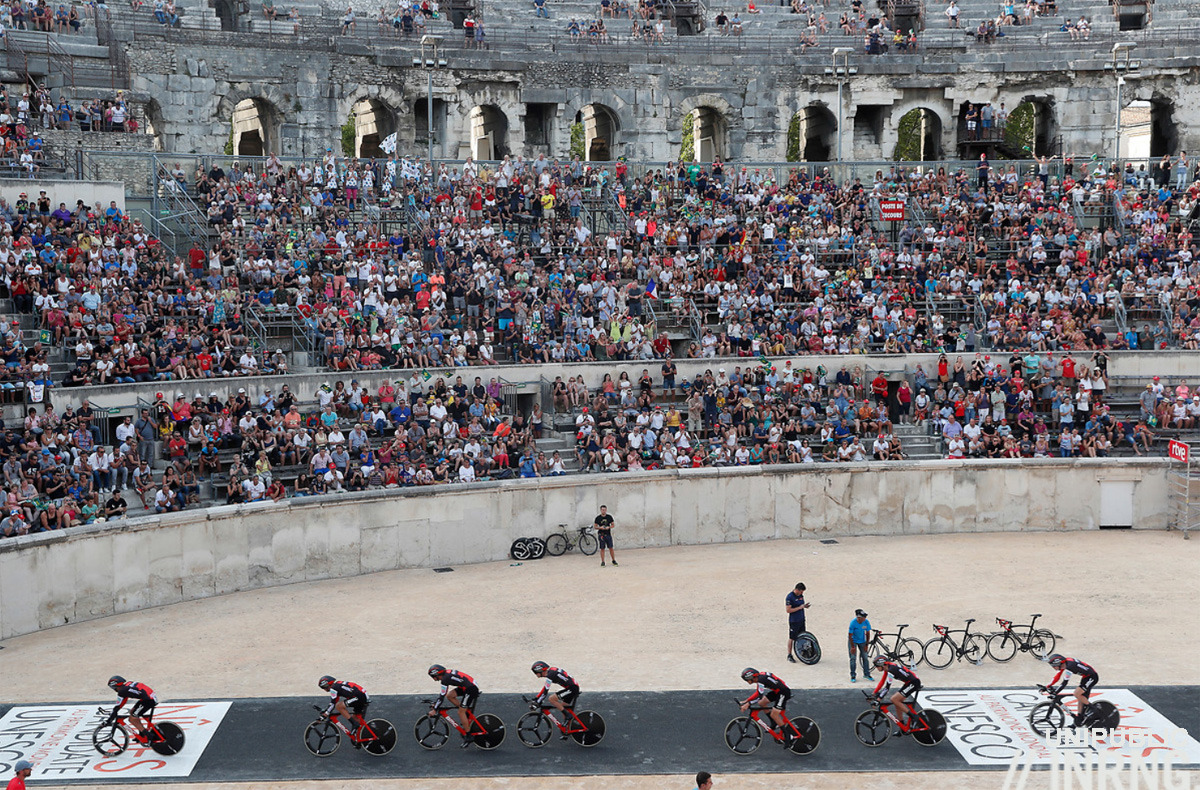
Rohan Dennis was the hot prospect who was starting to cool. 2017 was supposed to be about switching from time trials to stage races but his luck ran out in the Giro when he crashed in Sardinia and had to leave the race. But things had been on track before this including a select bunch sprint win in the Tour of the Alps. Would he have pushed Tom Dumoulin in the Giro? Probably not but he would have added plenty to the race. He recovered to win two stages in the Tour de Suisse and then went to the Vuelta where the plan was to aim for the TT stages and try some efforts in the mountains, he helped BMC win another team time trial on the opening day but didn’t make it to the Logroño time trial which could have really suited him. All told he might have dropped off your radar a bit but look out for him in 2018.
Marianne Vos was back racing and winning again. Only she’s no longer the best Dutch rider in the women’s peloton as Annemiek van Vleuten and Anna van der Breggen being ahead of her on the UCI rankings. Vos has turned 30 and turned to team management too with the WM3 Pro Cycling team which has signed up Belgian online payments firm WaowDeals as the title sponsor for the coming years. On the road she won the European Continental championships and collected multiple wins and her presence in the bunch helped team mate Kasia Niewiadoma ride away with the Women’s Tour of Britain. The injury problems are behind her.
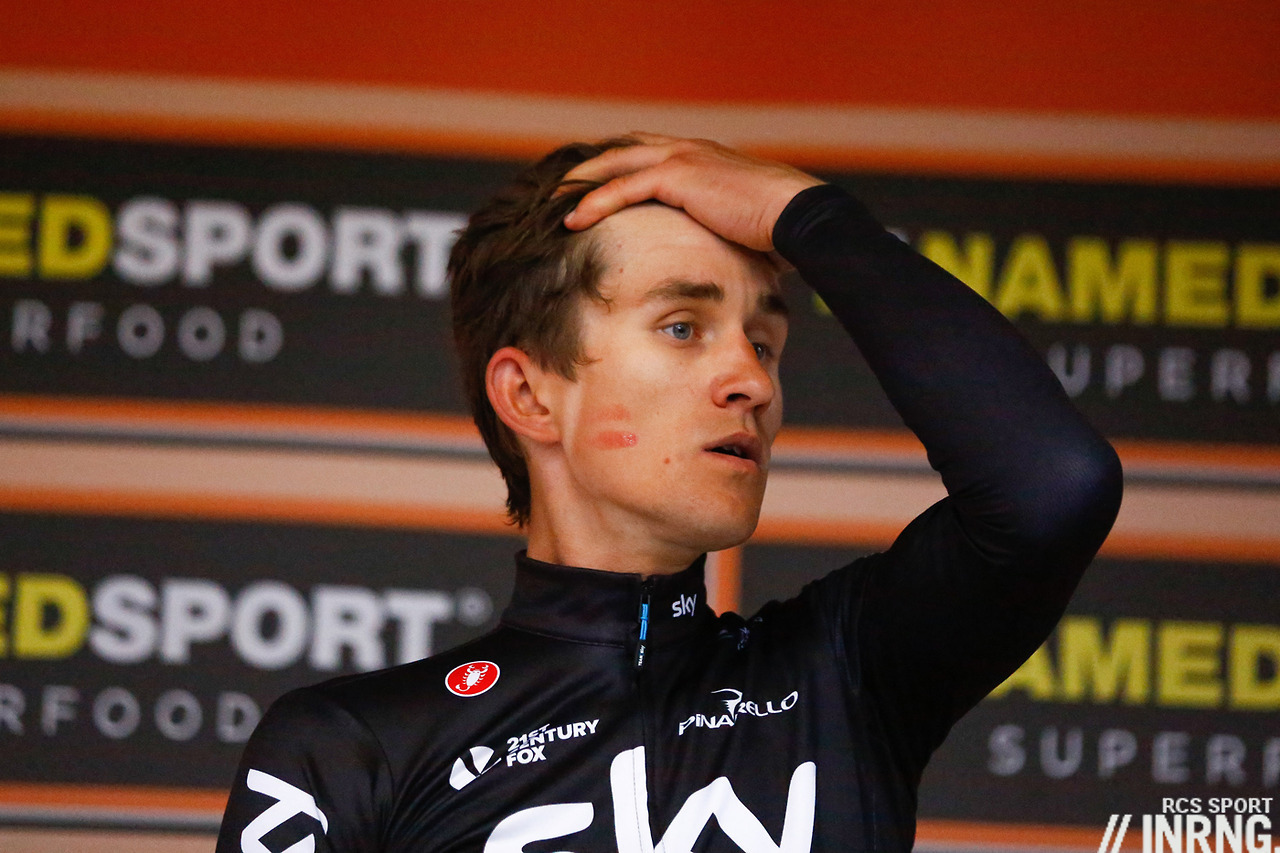
Michał Kwiatkowski made it to the finish of a race with Peter Sagan and beat him and then the rest of the year saw him caught between high ambitions and team duties. That was the tale of 2016 as we looked into 2017 and a scenario that was, if not copied, shared similarities. Kwiatkowski won Milan-Sanremo with a deft sprint and took the Clasica San Sebastian too. Once again he was a luxury lieutenant for Chris Froome in the Tour de France, one of Sky’s millionaire domestiques and you might remember him theatrically throwing away his sunglasses and moments later proverbially pulling up the handbrakeafter taking a long pull for Chris Froome on the Col d’Izoard. More people around the world probably saw this than watched him win in Sanremo. He’s a crucial rider at Team Sky and we’ll see if he can move onto picking off one week stage races.
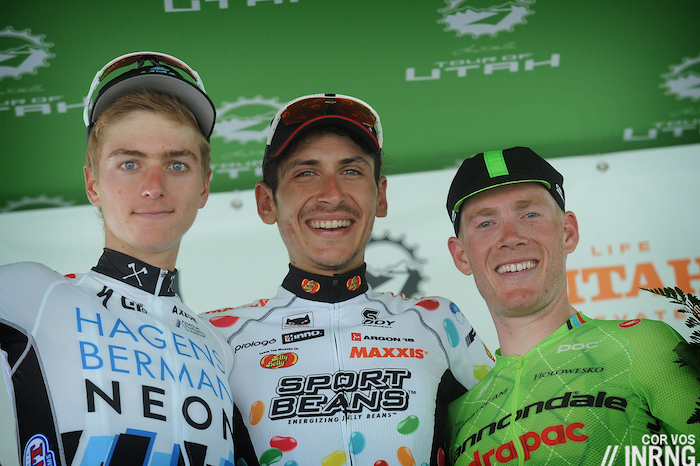
Lachlan Morton was picked out of interest in the character, the man rather than the results. He rode his way back into the World Tour after winning the Tour of Utah in 2016 and 2017 saw him bank a Vuelta a España in his legs, make the top-10 in Oman and finish as the best young rider in the Tour of California, a youth competition that is worth watching as many top teams bring talent. In hindsight the photo accompanying the piece is now as interesting given Adrien Costa is taking a break from the sport and Andrew Talansky took a surprise retirement when it was Morton who helped frame the idea that the World Tour peloton isn’t for everyone with its Whereabouts system, travel, the obligation to post sanitised messages tagging sponsors on social media and so on.
Bryan Coquard finished 2016 as one of the best riders in the world, or at least 10th on the CQ Rankings which was impressive given he rides for a second tier Pro Conti team. He’s still yet to win a World Tour race and the talk early this year was he’d join a World Tour team to support him achieve this, BMC were among those mentioned. Team manager Jean-René Bernaudeau wasn’t happy about losing him but accepted Coquard’s need to move up… only for things to change in the summer when Bernaudeau learned he was talking to rival Pro Conti teams. It’s one thing to lose a rider, another to have them go only to become a direct rival in local races on the French calendar and Bernaudeau was livid and effectively benched Coquard for the rest of the year. A fiasco, a coq-up but saved by Lilian Calmejane’s Tour de France stage win which gave Direct Energie the kind of headlines they craved. Coquard goes into 2018 as he went into this year in need of a big win only now he’s the figurehead of a new team in search of a Tour wildcard.

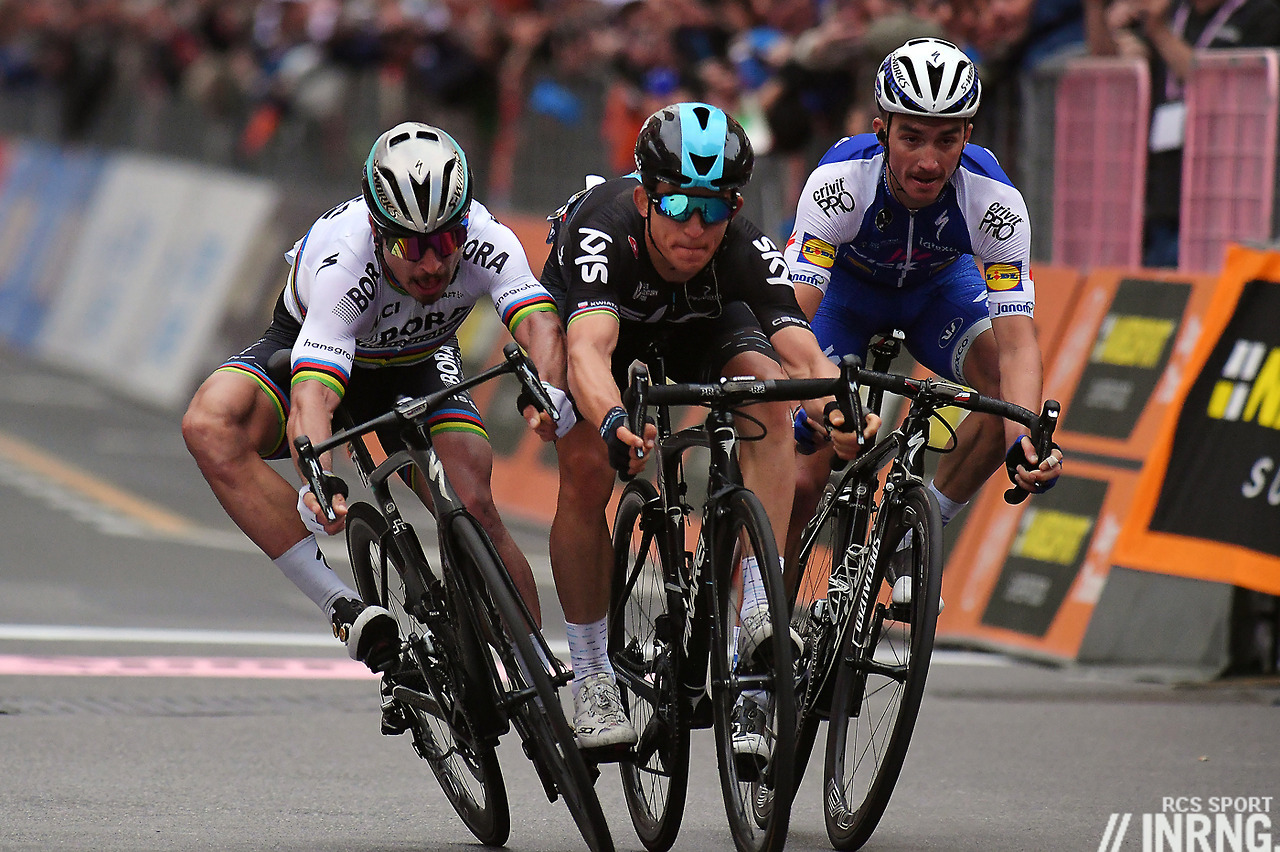
But Jonge, who won De Ronde this year?
Was just about to say the same, but in a less amusing way
It wasn’t his great rival Peter Sagan 😉
I wish i could say i was about to say the same – top drawer
And it was so unforgettable…
It would appear that leaving Peter the Great off of any list of riders–whether it be “Top Ten” or “Riders to Watch”–merely focuses more attention on Peter Sagan. In the words of Spock, “Fascinating.”
Gilbert won De Ronde. An attempt was made, though.
For next season I would have Romain Bardet as a rider to watch. He had a great 2016 but there was no improvement in 2017 from my point of view ! A bit like Aru, they really need to kick on to be considered as real contenders and not just podium people.
Agreed, would be good to see Bardet have a solid season… but his 2017 was a step up from 2016
Do you remember the James Bond / Peyragourdes stage at the TdF this year? The stage where Bardet crushed everyone and then finished 3rd overall at the end of the race?!? It may not be a huge step up, but it was at least on par with 2016. His entire year depended on a solid TdF and he delivered in spades.
He’s 27 so if he can take that consistency over the next 5-years he has a very solid shot to win at least one tour.
Agree with that, Bardet needed a stroke of luck and some risk taking to win his stage and get in the podium last year. This time he was climbing with the best and attacked them for the stage win, one of the few to attack Froome.
He had Froome on the ropes that day… was a brilliant stage
Maybe I was being harsh on him, it is true that it was the first time I saw him beat other contenders uphill. But at no point did I think he was capable of actually winning the tdf or any other race he has entered. He is young and has improved somewhat this year, I just hope that next year I can watch him and think of him as someone capable of winning.
It must be said that the field of actual GC competitors was exceptionally weak at this year’s TdF, worse than the year before (which wasn’t great, either).
Which, in my opinion, really takes away less from Froome’s victory than from his rivals’ performances – including Bardet whom I found a little disappointing, indeed.
2016 IMHO showed a better performance for the stage win, not only because he chose a daring strategy, but mainly because he finally had to throw in a notable lone performance on that last climb.
Going for the under-10′ effort as the rest won’t make him grow as a rider – others will best him in that kind of challenge, especially people who can ITT.
This year he often tried to rely on his team instead of pushing things down to a head-to-head defy – and given that his team was weaker, the result was far too obvious.
Perhaps my expectations about Bardet are a bit too high, but I think he’s got what’s needed to do better than this, despite his lesser (until now) physical basis, when compared to other big names.
I agree with Gabriele. Bardet is a disappointing rider and I don’t see him getting that much better. If his specialty is meant to be riding grand tours then his lack of ITT smarts and his seeming lack of willingness to improve in this area which is basically where Froome beat him is baffling. I read that even now the likes of the Yates brothers and Esteban Chaves are going to be in the wind tunnel attempting to improve in the discipline. But Bardet just does a Gallic shrug and says he doesn’t like time trialling. Well that’s fine Romain but in that case be prepared to never win a single grand tour. When Froome is done Tom Dumoulin won’t be any more forgiving. No, I’m pretty sure Bardet isn’t the future of anything.
Bardet has been to the wind tunnel several times, including one time when he and his agent paid themselves to go to the McLaren one in the UK because he was
keener than the team’s old bike sponsor on working on this. But time trials are not his thing, they probably never will be unless they are very hilly, eg when he was fifth in the TT to Megève late in the 2016 Tour.
Agree Bardet has been in the windtunnel, but it appears he thinks that’s all he needed to do. He needs to put the hours in on the TT bike, given how crucial it is to being a GT winner. It’s surprising given how serious he apparently is about the rest of his training & lifestyle.
Or, at least, he should ride accordingly to that kind of more or less surmountable limitation.
The last ITT at the Tour was probably a bad day in itself, but, come on, he performed significantly worse than a spent Quintana, or Barguil, Aru, Meintjes… Betancur!
The Sallanches ITT wasn’t just hilly, it was more of an uphill one (albeit not totally so): Aru made the podium and both Purito and Quintana were in the top ten.
Besides what’s probably Bardet’s actual best result in a short and indeed hilly ITT (the 6th place in 2015 Romandie), his best ITT results in the last 3 years are 30th places.
However, I guess that there’s some interest in building the myth of “not having worked properly before” on something (a bit like when Rolland moved to Slipstream, one of the funniest moment ever).
Truth is that Ag2R has been systematically working with the wind tunnel of Magny-Course (the people who achieved the Eric Barone’s record, besides obvious speed sports connections; Quickstep and Team Giant, among many others, also worked there) since 2009 at least, with BH bikes, and Bardet was there in 2013 with his Focus bike. He decided to go for some extra in the 2015-2016 winter, but it’s not like they hadn’t been working seriously on the matter (as the original article by inrng indeed pointed out). Typical cycling myhts.
And changing the French winds for the British ones didn’t make things better for him in any possible way: his results in the couple of seasons before the McLaren work are *exactly the same* as those in the following two ones.
If he’d just take into account what his ITT means are (or were, at the time), he should have avoided waiting for the last couple of kms of the final climb.
That *brilliant* Peyaragudes stage, where 9 riders arrived essentially together in less than 30″, was the main occasion Bardet (et al.) threw away in order to play the waiting game. Moving things on the Port de Balès – which was 30 kms away from the finish line, not 50 or 100 – would have produced quite a different result.
Few have noticed how often Bardet attacked from far at the Vuelta and nevertheless ended up losing little time from the selected group on the final climbs. It obviously was an experimental race, looking for a stage win but not even thinking much about the way. All the same, it made more evident than ever that the rider’s got a huge potential for prolonged efforts which is just wasted if he doesn’t ride accordingly – in a more thoughtful way than he was doing at the Vuelta, for sure.
Gabriele – I understand your point, but it’s a bit confusing because you brought in the Sallanches mountain ITT where Bardet came 5th. Bardet put 20 seconds into Purito, 30 seconds into Quintana, 35 into Valverde. He only lost time to exceptional TT mountain riders (Froome, Dumoulin, Aru and Porte). In that respect it was job well done.
Now, with that being said, I completely understand your point, Bardet needs to spend a lot of time on it this year. He lost 2 minutes on a 22km ITT this year… I’ll make that clearer, over 2 time trials, Bardet lost 2:40 to the yellow jersey winner… a race where Bardet finished 2:20 behind overall. Obviously, it isn’t that simple, but it’s very telling.
I named the Sallanches ITT just as a reference to what inrng said above. Great job but… I mean, I think that it makes little sense to put that in the same basket with other ITTs – the average speed was 32-33 kmh/h which means that, for example, the aero effect (a specific issue in Bardet’s case) was hugely below any usual TT. How often do you get something like that at the Tour (fine for me, I don’t love uphill ITTs, while the Giro does… I’d have one once every ‘x’ years)?
A very hilly ITT like the Embrun-Chorges one in 2013 had a 36-37 km/h average speed (Purito was 10″ back from Froome, Valverde 30″ back, neopro Quintana was 6th at 1’11″… in 32 kms!). The brutal 60 km-long 1200m-altitude-gain Cinque Terre ITT in Giro 2009 averaged some 39 km/h…
One more thing, and on this point I reiterate you are very likely correct. Bardet has the ability to manage prolonged efforts (ie. ITT’s), but he really needs to manage this and build it. The 2018 Tour has only 1 TT, which is rolling/hilly so it will be very challenging.
But, before they get to the ITT, there are flat stages that will crush someone who doesn’t have a big engine. Bardet can do this, but he needs to do way more than just spend time in a wind tunnel.
I would love for Landa, Bardet and Dumoulin to give Froome a huge battle, but if these guys don’t work on their weaknesses, Froome and his 7 musketeers will crush their rivals. In theory losing 1 rider at the tour weakens Sky, but I think it weakens the other teams more, therefore Sky still maintains a huge advantage. Nobody has a World Champ (Kwiat) to pull on brutal stages.
I agree more or less about everything – although I wouldn’t exactly think to World Champions as the most impressive category when pulling in brutal stages is concerned (perhaps Evans; Rui Costa? Maybe not even him… it’s generally a very different kind of performance). The likes of Nieve or Henao are normally more suited and effective, although people don’t get as easily impressed by their palmarés. But, hey, Kwiatko did it great, OTOH at Sky they’re great specialists in turning whomever into whatever.
Haha, yeah good point, World Champs aren’t all equal, but my overall point was that Team Sky will still be a huge force at the TdF with only 8 riders.
Look at the make-up of this year’s Sky vs 2018 proposed team structure:
2017
~ 1 team leader
~ 1 team leader backup / top top top climbing specialist (Geraint in 2017 – who crashed early)
~ 3 climbing domestiques – Nieve, Henao and Landa (who moved into Geraint’s role)
~ 4 Rouleurs – Kwiat, Rowe, Kirienka, Knees
Keep in mind that a) geraint crashed out early, effectively creating an 8-man team (Sky still dominated), b) Kwiat covered early parts of the mountain stages, thereby saving the 3 climbing domestiques and c) Rowe physically could barely contribute even if he was a strong leader.
2018
~ 1 team leader
~ 1 team leader backup / top top top climbing specialist (Geraint in 2017 – who crashed early)
~ 3 climbing domestiques – Nieve’s replacement , Henao and Landa’s replacement
~ 3 Rouleurs – Kwiat, Rowe, Kirienka
The 2018 team might still be stronger than other teams, as they will dedicate 1 or 2 guys to stage wins and sprints so it will hurt their collective strength more than Sky’s.
PS @The_Rawman: just in case it wasn’t clear, I agree with you – just giving another angle.
From here:
http://www.cyclingweekly.com/news/racing/tour-de-france/romain-bardet-i-have-no-regrets-we-rode-an-almost-perfect-race-and-we-tried-everything-343495
He confessed that his recent lack of training on his time trial bike had also cost him.
“I don’t like training on it and there’s no doubt that I paid for that today. I need to make more effort in that area. That will give me another boost,” he stated.
If it was Barguil saying that, you’d think fair enough, he’s already declared he doesn’t think he has the right kind of mentality or wish to adopt the lifestyle necessary for GT podiums. Bardet presumably wants to win the TDF and also gets paid a premium to challenge for it. TTing is crucial to that – even if he isn’t going to take time he needs to limit his losses.
As I said, I agree completely. But my further point is: when you’re a top rider and you come into the TdF, it’s not like you don’t know how you’re faring in ITTs.
You know that pretty well.
And if at the end of the day you didn’t work on that skill as much as you should have had, well, just ride your whole race taking that into account. Both the País Vasco and the Dauphiné ITTs, on rolling terrains, should have shown him that he was barely on par with previous years. The prologue just confirmed that (even if there risk-taking was also involved).
You can’t race as he did and then say: “Tactically, we rode an almost perfect race. We tried everything”.
No you didn’t. On a specific stage at least. It might work even with just one single attack on a single stage as in 2016. But show *you* are there to give it a try, not to rejoice in “real pleasure to see that the team make such an impact, that it can really put other riders into difficulty”.
Confirmation bias, for sure, but at a glance Lachlan Morton looks to have been by far the happiest rider in that picture. I hope the others find their way.
I agree that Bardet was better in 2017. But people forget just how hard it is for a pure climber to win a Grand Tour. Debating strategy is fun as there are no physiological limitations to be a DS, but Bardet wasn’t just pipped out of jaune by the GT best rider of the decade, he was also clearly defeated by Uran (who had his own issues to contend with) and nearly bested by a tired Landa performing domestique duties (all it would’ve taken was for Uran to -quite reasonably- forgo closing a gap). And that’s without Dumoulin, Nibali and Pinot. Bardet hasn’t proven he can consistently gap any of those guys in the mountains (bar Dumoulin, in the past), nor an in-form Aru or Quintana. And then there’s Chris Froome, who looked stronger at the Vuelta.
The list of non-top-tier time-triallists who won GTs on the road over the last ten years goes: Cobo, Horner, Aru, Quintana, Sastre and Hesjedal. Aru and Quintana were the clear strongest climbers on the clear strongest teams and still needed heroics to get there. Sastre had the strongest climber on his -the strongest- team, and needed to pull out the best time-trial of his very long career in order to win. Hesjedal pulled it out without being elite against the clock because Purito was worse (while hitting his all-time high mark against the clock – a 6th place over a pan-flat 30km ITT on the last day).
Bardet has a chance. But let’s not over-hype it. Landing on the podium is job done for him. Winning would involve absolutely everything going right, or a Cobo or Horner-like mid-career leap in form.
Re: the photo 🙂
I guess that grin is as happy as a pitbull can get, while young Joffrey looks like he can’t be happy if he isn’t the king.
Re: the best GT rider of the decade.
That’s still Contador. Froome will be in a couple of years time.
Re: climbers and GTs.
Quintana won a GT without being supported by the strongest team: both Urán’s and Aru’s were better at that Giro.
Of course you’re generally right – and I’ve often defended the same point about how hard the feat is for a pure climber – but *only* if you speak of the Tour de France, which looks (or looked) to be requiring a more narrow range of body types to be won, restricting winning option to the complete all-rounders. That was never the case for the Giro or the Vuelta, who were also won by climbers and, in the Vuelta’s case, even by some rare figures who weren’t that proficient uphill. Even if you focus only on the last decade, you’ll notice that the editions won by an athlete who isn’t a top TTer are about 40-50%.
Re: mid-career leaps.
Well, if it’s going to be a Horner or Cobo thing, it’s more about a last bullet. Hope Bardet will entertain us for some more years before going for that sort of leap. In fact, despite his subsequent contract in Movistar and in a Turkish team, Cobo practically ended his career with that Vuelta. He never finished a Classic anymore, nor got any GC top 20 in any GT, nor achieved any stage top ten; better said, he never placed anymore in the best 10 riders of *any* race except for some 6th or 9th place in the Tour of Turkey before retiring. Horner enjoyed some good time in Utah or Algarve with Lampre the following year but polemics, accidents, health issues and, well, age just pushed him all the way down to struggling in Republica Dominicana and the likes.